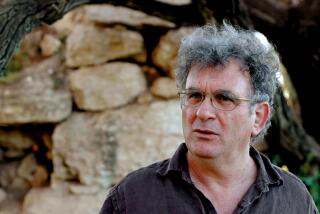BOOK MARK : Ideas, Not Oil, Oftentimes Fuel Arab World Changes
- Share via
Once political ideas were appropriated by governments, they were in danger of losing their meaning. They became slogans that grew stale by repetition, and could no longer gather other ideas around them into a powerful constellation, mobilize social forces for action or turn power into legitimate authority.
The idea of nationalism seemed to have suffered this fate. It would always exist as an immediate and natural reaction to a threat from outside--this was shown during the war between Iraq and Iran, when those parts of the Iraqi population expected to be hostile to the government gave it support. It was doubtful, however, whether it could serve as a mobilizing force for effective action, or as the center of a system of ideas by which life in society could be organized.
“Arabism,” the idea of a politically united Arab nation, might still be brought into action by a new crisis in the relations between Israel and its Arab neighbors; the quiescence of the Arab states during the Israeli invasion could be partly explained by the complexities of the Lebanese situation, and was not necessarily a foretaste of what would happen were Israel at war with other neighbors.
In general, Arabism was a weapon in conflicts between Arab states and a pretext for interference of one state in the affairs of others--the example of Egyptian President Gamal Abdel Nasser appealing over the heads of governments to the Arab peoples had not been forgotten.
About the other leading ideas, those of social justice and Islam, the contrary might be said: Not that they had lost their meaning, but that they had too much meaning, and too great a power as motives for action, to be harnessed for long to the purposes of any regime. Their roots lay too deep in history and conscience for them to be made into the docile instruments of government.
Governments that appealed to such deeply rooted and powerful ideas did so at their own peril. They were caught in the ambiguities and compromises of power, and if they used languages with such a strong appeal, their opponents could also do so to show the gap between what the government said and what it did. The assassination of Egyptian President Anwar Sadat in 1981 was a sign of the strength of such movements of opposition.
Even the most stable and the longest-lasting regimes, then, might prove to be fragile. There would certainly be shifts of power within ruling groups, because of death or palace revolutions: in 1985, for example, the ruler of the Sudan was deposed by a military coup combined with widespread civil disturbance. Such events might lead to changes in policy direction--as had happened when Sadat succeeded Nasser. But were there likely to be more violent and radical changes?
In some countries, there was a possibility that more lasting and formal institutions, which broadened the extent of participation in the making of decisions, would be restored. There was a general desire for this among the educated classes, and even some of the regimes themselves might decide it was in their own interest. Without some degree of participation, effective social and economic development could not take place, and real stability was impossible without institutions--that is to say, known and accepted conventions about the way power should be obtained, used and transmitted.
Whether such a change occurred would depend on the level of education, the size and strength of the middle classes and the confidence of the regime. It was not likely to occur in most Arab countries, but there were signs it was taking place in some of them. In Kuwait, the Parliament was restored in 1981, after a gap of several years, and showed itself to have independent opinions and the power to persuade government to take notice of them. But it was dissolved in 1986.
If more radical changes took place, it seemed more likely in the 1980s that they would take place in the name of an Islamic idea of the justice of God in the world than in that of a purely secular ideal. There was not one idea of Islam only, but a whole spectrum of them. The word “Islam” did not have a single, simple meaning but was what Muslims made of it. For “traditional” villagers, it might mean everything they thought and did. For more concerned and reflective Muslims, it provided a norm by which they should try to shape their lives and their acts could be judged, but there was more than one norm.
The fashionable term “fundamentalism” carried a variety of meanings. It could refer to the idea that Muslims should try to return to the teaching and practice of the Prophet and the first generation of his followers, or to the idea that the Koran alone provided the norm of human life. This could be a revolutionary idea, if Muslims claimed--as the Libyan leader Moammar Khadafi appeared to do--that they had the right to interpret the Koran freely.
The word could also be used of an attitude which might better be called “conservative”: the attitude of those who wished to accept and preserve what they had inherited from the past, the whole cumulative tradition of Islam as it had in fact developed, and to change it only in a cautious and responsible way. This was the attitude of the Saudi regime and its supporters, and of the Iranian revolutionary regime, although the cumulative traditions they accepted were very different from each other.
1991 by Albert Hourani. Reprinted with permission of Harvard University Press
More to Read
Sign up for Essential California
The most important California stories and recommendations in your inbox every morning.
You may occasionally receive promotional content from the Los Angeles Times.










